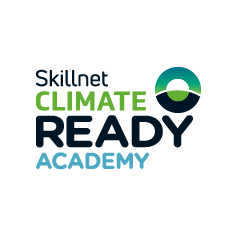


The Power of Upskilling: Evaluating the role of training in supporting Irish Enterprises to be climate resilient
Part 2 of 4 - Analysing Sustainability Materiality Assessments of Irish Enterprise





This article is the second in a four-part series analysing how Irish Enterprise is responding to the challenge of delivering a climate resilient future. This series is based on a study of 106 sustainability action plans created mainly by large and medium sized organisations who participated in Skillnet Climate Ready Academy’s Sustainability Leaders Programme (SLP) between 2022 and 2023. SLP uses the UN Sustainable Development Goals (SDGs) as a framework to help businesses develop a sustainability action plan.
Part two of the series covers:
In 2021, Skillnet Ireland in conjunction with 20FIFTY Partners launched the Skillnet Climate Ready Academy, an initiative to equip Irish businesses with the skills to tackle climate change1. Each programme within its suite takes an action-based learning approach delivered through live workshops which are held over twelve weeks. Included in the Academy suite is a range of programmes designed by industry for industry, targeting the development of sustainability, biodiversity, energy, and circularity leaders across Irish-based businesses.
As of 2022, these programmes collectively form Ireland’s first enterprise-led micro-credential climate action programme2. The Sustainability Leaders Programme (SLP) equips sustainability professionals with the skills to overcome the challenges of implementing sustainable business practices, transitioning to a sustainable business model and ultimately supporting a decarbonised economy3. To do so, it leverages the UN Sustainable Development Goals (SDGs) as a heuristic device to assist learners in identifying areas key to a business’s resilience4.
To complete the Sustainability Leaders Programme, businesses are required to create a sustainability action plan, using the SDGs as its foundation. The output of plans created by Irish enterprises who completed SLP between January 2022 and July 2023 form the basis of this present study.
The sample size consists of 57% SMEs and 43% large businesses, with the most frequent sectors being manufacturing, transport, pharmaceutical, food & drink & ICT, as presented in part one of this series.
A sustainability materiality assessment is a critical first step in informing the direction of an organisation’s sustainability strategy and action plan. In its most basic form, if something is deemed to be ‘material’, it is understood to be ‘important or have an important effect’5 on a decision-maker or its stakeholders. Materiality can be an important tool for organisations in helping to shape the business strategy, inform decision making and prioritise its areas of focus6. In the context of sustainability, the Sustainability Leaders Programme 2022-2023 defined a materiality assessment as ‘identifying the societal and environmental issues that present risks or opportunities to a company while taking into consideration the issues of most concern to internal and external stakeholders’7. This is referred to as an ‘outside-in’ perspective on materiality8, whereby external challenges are material to a company if they threaten its internal resilience, as represented below in Figure 1.
 Figure 1: ‘Outside-In’ approach to materiality assessment.
Figure 1: ‘Outside-In’ approach to materiality assessment.
SLP was launched in 20219, prior to the introduction of the EU’s Corporate Sustainability Reporting Directive at the end of 202210. CSRD disclosures require materiality assessments which address both ‘outside-in’ risks and opportunities, and ‘inside-out’ impacts of company practices on environmental and social factors11. Whilst SLP has since updated its definition of a materiality assessment to be in alignment with CSRD requirements, this study will assess materiality solely from an ‘outside-in’ perspective, as this was used in SLP during the time of raw data collection.
What are the areas that Irish Enterprise perceive as posing risks and opportunities to their resilience and stakeholders?
 Figure 2: Frequency of Top 4 SDGs Linked to Materiality Assessments.
Figure 2: Frequency of Top 4 SDGs Linked to Materiality Assessments.
SDG 12 – Responsible Consumption and Production
A deeper examination of the materiality assessments linked to SDG 12 – Responsible Consumption and Production in Figure 3, highlights that of the 65% of materiality statements linked to SDG12:
 Figure 3: Frequency of materiality assessments linked to SDG 12 which reference circular methods.
Figure 3: Frequency of materiality assessments linked to SDG 12 which reference circular methods.
Material Importance of Economic and Social Pillars to Irish Enterprise Sustainability Planning
Whilst the SLP scope focuses on climate resilience, findings show enterprise factors in the material importance of the economic and social pillars in their materiality assessments.
When the economic SDGs are assessed against enterprise materiality assessments:
 Figure 4: Frequency of economic SDGs aligned with Irish enterprise materiality assessments.
Figure 4: Frequency of economic SDGs aligned with Irish enterprise materiality assessments.
When the social SDGs are assessed against enterprise materiality assessments:
 Figure 5: Frequency of social SDGs aligned with Irish enterprise materiality assessments.
Figure 5: Frequency of social SDGs aligned with Irish enterprise materiality assessments.
Engage with the authors of this series Aisling O’Connor, Maria Kelly and Colm Gaskin and the wider Academy team on Climate Action and Upskilling at climatereadyacademy@20fiftypartners.com
References